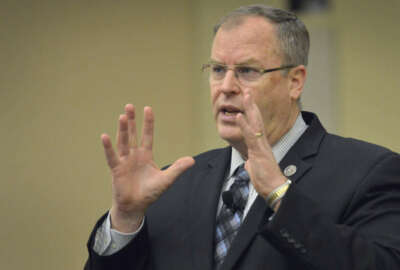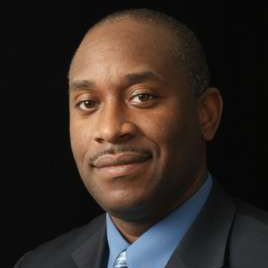
Improving the federal hiring process, part 2
A diverse group of associations has urged Congress to put federal hiring reforms into the 2021 National Defense Authorization bill.
Best listening experience is on Chrome, Firefox or Safari. Subscribe to Federal Drive’s daily audio interviews on Apple Podcasts or PodcastOne.
As we’ve reported, a diverse group of associations has urged Congress to put federal hiring reforms into the 2021 National Defense Authorization bill. Earlier we heard from former deputy Defense secretary Bob Work, representing the artificial intelligence technology community. Federal Drive with Tom Temin also heard from the chairman of the National Commission on Military, National and Public Service, former congressman Joe Heck.
Interview transcript:
Tom Temin: Joe, good to have you back. It seems like we’re talking a lot these days.
Joe Heck: Yeah. Great to be back with you, Tom.
Tom Temin: And really, this whole idea of public service hiring reform was central to your commission, even before you got together with the other two commissions to recommend all of these changes to Congress. Fair to say?
Joe Heck: Certainly. It was one of our primary charges during our mandate that was given to us by Congress was to look at how we could increase participation in public service, and one of the areas we identified as an obstacle to public service were the myriad of intricacies and complications in order to get into federal service.
Tom Temin: And the whole hiring process. In many ways seems like the Rock of Gibraltar. So many ships have sailed there and they keep foundering on the same shoals. Why does this seem so impervious to reform, do you think?
Joe Heck: Well, I think part of it is just the lack of momentum or the lack of innovation within institutions. And I think what we find now is the confluence of three separate entities. The National Security Commission on Artificial Intelligence, our commission on Military, National Public Service, and the Cyberspace Solarium. Commission, all coming back with similar recommendations, identifying the same problem and putting forward really meaningful and groundbreaking changes in order to try to recruit, retain the best and brightest into federal public service.
Tom Temin: And the letter to the members of Congress mentioned that would be responsible for the 2021 NDAA mentioned greater use of the flexibilities that already exist in federal hiring within title five and some of the amendments there too. I’ll ask you the same question I asked Bob Work when I spoke with him, and that is, what needs to be legislative if these authorities and flexibilities already exist in law?
Joe Heck: Yeah, that’s a great question. And so, as we did a really deep dive on federal hiring authorities, we certainly found areas where authorities already exist and are just underutilized. And so we make the recommendations that there should be a standardization and expansion of things like non competitive eligibility for all interns, fellows and scholars. You know, three years of NCE (Noncompetitive Eligibility) for all full time national service participants and returned Peace Corps volunteers. What we found especially is that we are not fully leveraging those who come into the federal service as interns, right. So you have somebody who has come in as an intern and after getting actual experience with a federal agency wants to seek full time employment with that agency Yet from 2010 to 2018, new hires of student interns fell by about 90% from 35,000 in 2010 to 4000 in 2018. And so it’s not just looking at the current authorities, but also establishing new pathways to federal service things like creating a public service corps similar to an ROTC, and coordinate with ROTC if on the same campuses, establishing public service academies similar to what was done at Arizona State University. Because it’s not just getting folks in the doors, it’s making them aware of the opportunities as well.
Tom Temin: And of course, no one has really taken on title five, is there anything within that venerable part of the US code that could be modified do you think without destroying the ideas of meritorious civil service and competitive civil service?
Joe Heck: Well, there certainly are. And so one of the things that we recommended our commission report is a modernizing and enhancement of veterans preference hiring as well as veterans recruitment appointment, trying to ensure that those eligibilities are being best used to help transition new vets into federal service. We’re looking at and make recommendations to improve and simplify the competitive hiring process. Part of that is revising job descriptions, improving USAJobs, interoperability, doing things that are done in the private sector like accepting standard resumes, avoiding keyword based resume reviews, eliminating self assessments, things that actually decrease the likelihood of an individual being hired. And we know from government wide OPM hiring data, that hiring managers reject more than half of all lists of finalists without hiring anyone from the list. And that tells us that the wrong people are being put on the list. So we have to fix the system so that individuals are matched to the positions based on their knowledge, skills and attributes. And we decrease the bureaucratic obstacles in their way in order to find a meaningful job in the federal civil service.
Tom Temin: And, of course, the NDA is everyone’s vehicle, thing runs 2000 pages, because that’s the one thing that Congress most assuredly passes every year. Have you gotten any reaction? Or do you sense that the chairman and ranking members of the House and Senate Armed Services committees feel, yeah, we’d like to take this on?
Joe Heck: Well, it’s been difficult to get the pulse because of the delayed processing of this year’s NDAA due to the COVID pandemic. But we believe the three commissions that joined together on this letter, that because our charges intersected in the area of national security workforce, that the NDAA is the prime location to enact some of these changes, specifically where it intersects with national security like in the areas of cybersecurity, which all three of us addressed, interestingly, individually within our commissions, not knowing exactly what the other was doing but to find out at the end that we were all on the same page. So we think that when you have three commissions working in parallel that come up with the same recommendations independently of each other, that hopefully Congress will sit up take notice and adopt these recommendations.
Tom Temin: Former Nevada Congressman Joe Heck is chairman of the National Commission on Military, National and Public Service. Thanks so much as always for joining me.
Joe Heck: Thank you, Tom.
Copyright © 2024 Federal News Network. All rights reserved. This website is not intended for users located within the European Economic Area.
Tom Temin is host of the Federal Drive and has been providing insight on federal technology and management issues for more than 30 years.
Follow @tteminWFED
Related Stories





